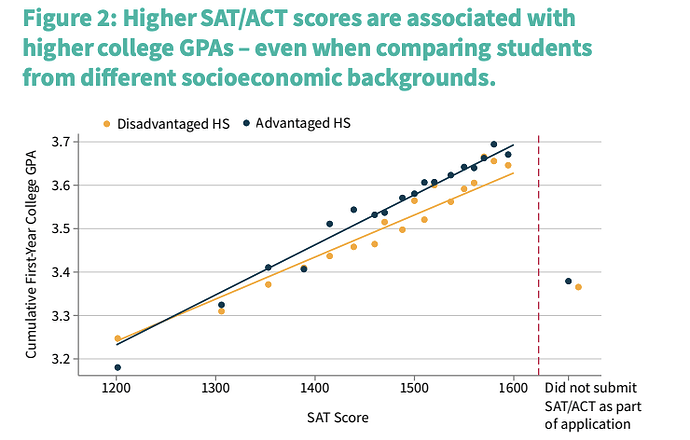The SAT/ACT doesn’t cover calculus, and it’s far from a consistently reliable indicator of whether the student can hack calculus. Being able to hack calculus also isn’t a requirement at typical highly selective private colleges, such as the one you mention (Dartmouth). For example, you mentioned being able to take “Concepts in Statistics” at a public U to fulfill math distribution requirement. Dartmouth’s quantitative and deductive science general ed requirement can also be fulfilled by passing a single class in Introductory Statistics. No further math classes are required to graduate. Some highly selective private colleges don’t require taking any math classes to graduate.
Public U’s are far more likely to admit by major than highly selective private colleges. Stanford/Harvard/Dartmouth’s do not admit by major, and make it simple to switch majors. All of these colleges offer many majors that are not math heavy, which are usually perceived as easier by students. And a good portion of students at Stanford/Harvard/Dartmouth’s do change majors from math-heavy fields to fields that use little math, in many cases because they get some non-A grades. Unsatisfactory performance in an absolute sense (failing or near failing) is almost unheard of, regardless of whether admitted with or without tests. Even having GPAs below A/A- is becoming rare. For example, in the most recent class of 2025 Harvard senior survey, the median self-reported GPA was 3.9 out of 4.0. Only 6% of seniors reported having a GPA of below 3.5.
The Duke Study at https://cepa.stanford.edu/sites/default/files/grades_6.0.pdf reviewed what happened to a group of hooked students at Duke that were admitted with subpar academic qualifications – lower grades, lower rigor, lower scores, worse LORs, worse essays, … They found a substantial 26% expected to major in a math heavy field, but ended up majoring in a humanities / social science field instead. Among the full class, a much smaller 11% switched from a math-heavy to math-light major. Among the hooked students that switched major, mean SAT was 1270. Among the hooked students that successfully persisted in the math-heavy major, mean SAT was 1289. Other criteria showed a stronger relationship with major switching than test score such as harshness of grading within specific Duke classes, gender, and HS course rigor.
I am not aware of any studies that reviewed whether test optional kids were more likely to switch majors. There are studies that compare rate of receiving degrees in different majors, but they don’t distinguish between starting in particular majors vs switching. For example, the Bates review found that math, physics, and philosophy majors were all more likely to be test submitters than the overall average. Is that because Bates admits who are interested in math, physics, and philosophy tend to have higher test scores than average? Or is that because Bates students with relatively lower scores are switching out of those majors?
The Bates review found that both graduation rate and cumulative GPA of graduates was nearly identical between submitters and non-submitters. It doesn’t support the idea of non-submitters not being able to graduate. This review was done several years ago, before there was influence from COVID effects.
